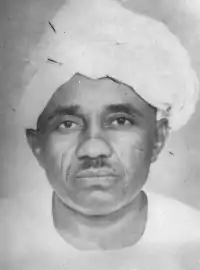September 1983 Laws
In September 1983, Sudanese President Gaafar Nimeiry introduced Islamic Sharia Laws in Sudan, known as September Laws (Arabic: قوانين سبتمبر), disposing of alcohol and implementing hudud punishments like public amputations for theft and flogging for alcohol consumption. Nimeiry declared himself the imam of the Sudanese Umma, leading to concerns about the undemocratic implementation of these laws. Hassan al-Turabi (then the attorney general) assistanced and supported this move, differing from Sadiq al-Mahdi's (leader of the opposition) dissenting view.
Nimeiry's collaboration with the Muslim Brotherhood aimed to end sectarian divisions and consolidate Islamic governance, and despite Nimeiry's assertion that the sharia laws reduced crime rates, his economic policies, including Islamic banking, led to severe economic issues in Sudan, including high inflation and substantial external debt. This led to his removal in 1985.
Ultimately, Nimeiry's Islamic policies contributed to renewed conflict in southern Sudan in 1983, ending the Addis Ababa Agreement of 1972, which had granted regional autonomy and recognised the diversity of Sudanese society. This shift towards Islamic governance played a crucial role in Sudan's political landscape with multiple parties including the National Islamic Front advocating for Islamic laws during Omar al-Bashir era between 1989 to 2019.
Background
One condition for national reconciliation between Sudanese President Gaafar Nimeiry and Sadiq al-Mahdi, leader of the National Front, was the re-evaluating the Sudanese laws and 1972 Addis Ababa Agreement that granted the south self-governance.[1]
By 1977, a committee was working to align Sudanese law with the sharia, and the Muslim Brotherhood, headed by Hassan al-Turabi, was gaining influence in university student political groups. al-Turabi committee concluded that only 10% of the laws adhere to the Sharia.[2] While legislative attempts to Islamise the law through the People's Assembly were met with resistance. In 1979, the ongoing disagreement between the Sudanese Brotherhood and the parent organisation resurfaced. Hassan al-Turabi, then attorney general in 1979,[3] declined allegiance to the the International Muslim Brotherhood, and a split occurred, with Sheikh Sadiq al-Mahdi and his followers aligning with him. Youssef Nour al-Daim took charge of the Sudanese Brotherhood since 1969, although it remained a minor faction with limited influence. Al-Turabi designated his wing the "Sudanese Islamic Movement."[1]
At the same time, Nimeiry's attempt at implementing an "Islamic path" in Sudan from 1977 to 1985, including aligning with religious factions, ultimately failed. His transition from nationalist leftist ideologies to strict Islam was detailed in his books "Al-Nahj al-Islami limadha?" and "Al-Nahj al-Islami kayfa?" The connection between Islamic revival and reconciling with opponents of the 1969 revolution coincided with the rise of militant Islam in other parts of the world. Nimeiry's association with the Abu Qurun Sufi order influenced his shift towards Islam, leading him to appoint followers of the order into significant roles. [4]
Announcement and aftermath

The process of legislating the "Islamic path" began in 1983, culminating in the enactment of various orders and acts to implement sharia law and other Islamic principles.[4]
In September 1983, President Gaafar Nimeiry introduced sharia law in Sudan, known as September Laws.[5] He was assisted in drafting the laws by a group of Islamists including al-Nile Abu Qarun, Awad al-Jaid, and Badriya Suleiman, who were students of al-Turabi.[6][7][8] The laws lead to disposing of alcohol and implementing hudud (capital) punishments like public amputations for theft and flogging for drinking alcohol.[9] Hassan al-Turabi supported this move, differing from Sadiq al-Mahdi's dissenting view. al-Turabi and his allies within the regime also opposed self-rule in the south, a secular constitution, and non-Islamic cultural acceptance. The Islamic economy followed in early 1984, eliminating interest and instituting zakat. Nimeiry declared himself the imam of the Sudanese Umma in 1984.[4]
Opposition to Nimeiry's Islamisation came from various quarters. Southerners, northern secular and religious voices, and even the judiciary voiced concerns about the undemocratic implementation and lack of consultation. Sadiq al-Mahdi, leader of the Umma Party, initially jailed for his opposition.[10] Nimeiry ordered all alcoholic beverages in Khartoum spectacularly dumped into the Blue Nile.[11][12] Until this prohibition, the trade in such goods as well as ownership of nightclubs and bars had traditionally been dominated by Greek merchants, who controlled around 80% of the market.[13]
Nimeiry was allied with the Muslim Brotherhood led by Hassan al-Turabi and allowed the group to carry out its advocacy, political, and economic activity. The latter took advantage of the opportunity in order to empower itself and take control. On the system from within. The group blessed the announcement of implementing the laws of September 1983 and took out massive marches in support of the move. It also provided its political support for the laws through its advocacy platforms, student organisations, and voluntary organisations, as well as its cadres of judges such as Muhammad Mahjoub Haj Nour and Al-Makashfi Taha Al-Kabashi.[14]
The Islamic economy followed in early 1984, eliminating interest and instituting zakat. Nimeiri declared himself the imam of the Sudanese Umma in 1984.[15] Nimeiry's establishment of the Islamic state in Sudan was outlined in his speech at a 1984 Islamic conference.[4] Then, in 1984, Nimeiry began proposing broad constitutional draft amendments to the 1973 Constitution to declare Sudan an "Islamic Republic" (Article 1 of the draft amendments), and for the President of the Republic to be "a leader of the believers and the head and imam of the state" (Article 80 of the draft amendments), and for the sources of Sharia to be It is the law and custom that does not conflict with it (Article 59 of the draft amendments). It also stipulated that it is not permissible to enact a law that conflicts with Islamic law and the consensus of the nation (Article 65), as the text thus excluded non-Muslims by consolidating the religious state’s dominance over the aspects of public life.[16] Nimeiry association with the Abu Qurun Sufi order and his self-proclaimed position as imam led to his belief that he alone could interpret laws in line with the sharia.[4]
Nimeiry justified the implementation of the sharia due to a rising crime rate. He claimed a reduction of crime by over 40% within a year due to the new punishments. Nimeiry attributed Sudan's economic success to the zakat and taxation act, outlining its benefits for the poor and non-Muslims. However, his economic policies, including Islamic banking, led to severe economic issues that exacerbated the economic situation in Sudan with the inflation reaching 41% and 9 billion dollar external debt.[4]
Nimeiry's collaboration with the Muslim Brotherhood and the Ansar aimed to end sectarian divisions and implement the sharia. The Ansar, despite initial collaboration, criticised Nimeiry's implementation as un-Islamic and corrupt.[4] The political landscape shifted with Nimeiry's removal in 1985, leading to the emergence of numerous political parties. The National Islamic Front (NIF), Ansar, and Khatmiyya Sufi order (DUP) played crucial roles in Sudan's politics. Hassan al-Turabi and the NIF consistently supported the Islamic laws and resisted changes.[4]
The law was frozen during Sudan transition for democracy after the 1985 coup d'état but reinstated during the Omar al-Bashir era between 1989 to 2019 after the 1989 coup d'état.[17][18] In 2013[9] and 2023,[18] there were documented cases of men in Sudan being sentenced to hand amputation for stealing. The court's decision to impose hand amputation for theft was seen as severe and controversial form of punishment.[18] In 2022, a woman was due to be stoned for adultery[19] before being jailed for 6 months.[20]
Amputation
The period from 1983 to 1985 witnessed severe drought and desertification in Sudan, which had a significant impact on agricultural productivity and food availability in the region that lead to a famine declared on 29 November 1984.[21] However, the implantation of September Laws and capital punishment was not hindered by the famine.[22]
As many as 300 Sudanese endured the painful amputation of limbs. These punishments, administered by emergency courts, were inflicted on those found guilty of stealing property worth over $40. These amputees faced constant social stigma and accusations, making it increasingly challenging to secure employment. Their severed limbs were perceived as marks of criminality, leading to wrongful arrests and a life of taunts as they walked the streets. In many cases, these punishments shattered family lives, as returning home without a limb brought shame. Furthermore, the crude amputation procedures, performed by individuals with no medical training, exacerbated their suffering.[23]
To cope with the physical and emotional pain, some amputees resorted to crime or addiction. However, they rallied together to form a self-help association, aiming to establish small businesses and obtain medical and legal assistance. They sought recognition as a charity but faced opposition from the government, citing concerns that it might be used as a front for criminals and disrupt the Sudan's form of Islamic justice.[23]
According to Sudanese historian al-Mahbob Abdul Salam, al-Turabi fainted while observing the application of the capital punishment of amputation at Kober prison.[2]
Execution of Mahmoud Muhammad Taha
Another Islamic movement in Sudan was the Republican Brotherhood, founded by Mahmoud Muhammad Taha. This movement embraced the concept of Islam having two messages and abandoned numerous Islamic practices. It advocated for peaceful coexistence with Israel, gender equality, criticised Wahhabism, called for freedoms and refraining from implementing Islamic criminal punishments, and championed a federal social democratic government. Taha strongly opposed the ban on the Sudanese Communist Party and condemned the decision as a distortion of democracy, even though he wasn't a communist. He was sentenced to apostasy in 1968 and again in 1984.[4]
Taha was executed on 18 January 1985 under the September Laws.[24][25] He was sentenced to death for the crime of apostasy and sedition. Taha's execution sparked international outrage and condemnation, with many human rights organizations and individuals decrying the violation of his right to freedom of thought and expression.[26]
Southern Sudan
On 5 June 1983, Nimeiry sought to counter the south's growing political power by re-dividing the Southern Region into the three old provinces of Bahr al Ghazal, Al Istiwai, and Aali an Nil; he had suspended the Southern Regional Assembly almost two years earlier. The southern-based Sudanese People's Liberation Movement (SPLM) and its military wing, the Sudanese People's Liberation Army (SPLA), which emerged in mid-1983, unsuccessfully opposed this re-division and called for the creation of a new united Sudan.[27]
Nimeiry's Islamic phase marked the end of the Addis Ababa Agreement of 1972 and resulted in renewed conflict in Southern Sudan in 1983, which had granted regional autonomy and recognised the diverse nature of Sudanese society. The 1972 agreement ensured equality regardless of race or religion and allowed for separate personal laws for non-Muslims. However, hostilities escalated due to oil discovery, dissolution of the Southern Regional Assembly, and decentralisation efforts.[10] In the South, the September Laws were bitterly resented both by secularised Muslims and by the predominantly non-Muslim southerners. The SPLM denounced the sharia and the executions and amputations ordered by religious courts. Meanwhile, the security situation in the south had deteriorated so much that by the end of 1983 it amounted to a resumption of the civil war.[27][10]
Further reading
- Warburg, Gabriel R. (1990). "The Sharia in Sudan: Implementation and Repercussions, 1983-1989" (PDF). Middle East Journal. 44 (4): 624–637. ISSN 0026-3141. JSTOR 4328194.
- Warburg, Gabriel (2003). Islam, Sectarianism and Politics in Sudan Since the Mahdiyya. Hurst & Company. ISBN 978-1-85065-588-6.
- Layish, Aharon; Warburg, Gabriel R. (1 January 2002). "Background to Islamization". The Reinstatement of Islamic Law in Sudan under Numayrī. Brill. pp. 1–69. doi:10.1163/9789004491168. ISBN 978-90-04-49116-8.
References
- هدهود, محمود (15 April 2019). "تاريخ الحركة الإسلامية في السودان". إضاءات (in Arabic). Retrieved 30 August 2023.
- al-Arabiya (8 March 2023). تطبيق الشريعة – الجزء الاول [Application of Sharia - Part One] (in Arabic).
- Shinn, David H. (2015). "Popular Congress Party" (PDF). In Berry, LaVerle (ed.). Sudan : a country study (5th ed.). Washington, D.C.: Federal Research Division, Library of Congress. pp. 254–256. ISBN 978-0-8444-0750-0.
 This article incorporates text from this source, which is in the public domain.
This article incorporates text from this source, which is in the public domain.{{cite encyclopedia}}: CS1 maint: postscript (link) - Warburg, Gabriel R. (1990). "The Sharia in Sudan: Implementation and Repercussions, 1983-1989". Middle East Journal. 44 (4): 624–637. ISSN 0026-3141. JSTOR 4328194. Archived from the original on 13 December 2022. Retrieved 21 July 2023.
- "Sudan court sentences three men to hand amputation for stealing | Global development | The Guardian". amp.theguardian.com. Retrieved 20 October 2023.
- "أبرز المشكلات والأزمات السياسية التي مر بها السودان". BBC News عربي (in Arabic). Retrieved 20 October 2023.
- "بدرية الداعشية نصيرة الاستبداد .. بقلم: عصام جزولي". سودانايل (in Arabic). 17 December 2015. Retrieved 22 October 2023.
- "النار ولعت! – النيلين". al-Nilin (in Arabic). 12 February 2014. Retrieved 22 October 2023.
- "Sudan cuts off hand, foot of man convicted of robbery: activists". Reuters. 27 February 2013. Retrieved 22 October 2023.
- Fluehr-Lobban, Carolyn (1990). "Islamization in Sudan: A Critical Assessment". Middle East Journal. 44 (4): 610–623. ISSN 0026-3141. JSTOR 4328193.
- Deckert, Roman; Joerin, Julia (2015). "Der Grexit von Khartum". Zenith (in German). 4.
- قوانين سبتمبر 1983, 13 January 2015, retrieved 20 October 2023
- Chaldeos, Antonis (2017). The Greek community in Sudan (19th-21st cen.). Athens. pp. 138–158. ISBN 978-618-82334-5-4.
{{cite book}}: CS1 maint: location missing publisher (link) - al-Faisal, Babkir (3 November 2021). "حلقة التكفير الشريرة | الحرة". www.alhurra.com (in Arabic). Retrieved 20 October 2023.
- Warburg, Gabriel R. (1990). "The Sharia in Sudan: Implementation and Repercussions, 1983-1989". Middle East Journal. 44 (4): 624–637. ISSN 0026-3141. JSTOR 4328194. Archived from the original on 13 December 2022. Retrieved 21 July 2023.
- Shaib, Abdelkhalig (15 December 2020). "ثُنائيَّة الدّين والدّولة في السودان: هل فَكَّت اتفاقيات جوبا وأديس أبابا طَلاَسِم هذه العلاقة؟". Arab Reform Initiative (in Arabic).
- Belay, Netsanet (16 March 2013). "Opinion: Sudan must end 'cruel' amputation punishment". CNN. Retrieved 22 October 2023.
- Salih, Zeinab Mohammed (14 February 2023). "Sudan court sentences three men to hand amputation for stealing". The Guardian. ISSN 0261-3077. Retrieved 22 October 2023.
- "Sudan: 'No-one to intervene' for woman sentenced to stoning". BBC News. 26 October 2022. Retrieved 22 October 2023.
- "Sudanese woman jailed for kissing man". BBC News. 15 December 2022. Retrieved 22 October 2023.
- "Sudan - Drought/Famine" (PDF). USAID.
- Khogali, Mustafa M. (1991). "Famine, Desertification and Vulnerable Populations: The Case of Umm Ruwaba District, Kordofan Region, Sudan". Ambio. 20 (5): 204–206. ISSN 0044-7447. JSTOR 4313823.
- Rule, Sheila (16 July 1986). "LIFE OF SHAME OF AMPUTEES IN THE SUDAN". New York Times.
- "Ustadh Mohamed Taha: 12 years after his execution". Sudan Human Rights Organization. Retrieved 22 October 2023.
- O'Sullivan, D. (September 2001). "The Death Sentence for Mahmoud Muhammad Taha: Misuse of the Sudanese Legal System and Islamic Shari'a law?". The International Journal of Human Rights. 5 (3): 45–70. doi:10.1080/714003729. ISSN 1364-2987. S2CID 144481416.
- Packer, George (3 September 2006). "The Moderate Martyr". The New Yorker. ISSN 0028-792X. Retrieved 22 October 2023.
- "Sudan - National Reconciliation". countrystudies.us. Retrieved 28 August 2023.
 This article incorporates text from this source, which is in the public domain.
This article incorporates text from this source, which is in the public domain.




